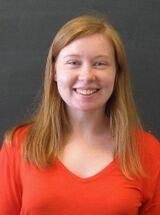Celebrating CAMB Graduates
Please join us in our celebration as we highlight our CAMB graduates.
The profiles are sectioned by degree type:
Doctor of Philosophy
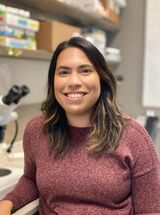
Jennifer Aleman
Mentor: Maya Capelson, PhD
Genetics and Epigenetics Program
Thesis Title: Nuclear pore component Mtor regulates levels of dosage compensated gene expression in Drosophila
Research and Lab Description: My research focused on determining a gene regulatory role for a nuclear pore complex protein called Mtor within the context of Drosophila dosage compensation. Our lab is interested in understanding the many ways in which nuclear pore complex proteins can affect gene regulation, and we use Drosophila as a model system to understand the functional and developmental impacts that these proteins have in a gene regulatory context.
Mentor Comment: Jen has been an excellent graduate student and a joy to work with. She is an outstanding experimentalist, focused and thoughtful, and her thesis project truly blossomed in her hands, leading us into a new scientific direction, the field of dosage compensation. I am proud of all her accomplishments, and I am sure her talents and determination, as well as her passion for mentorship and scientific outreach, will serve her well into the future!
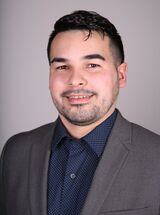
Kevin Alicea-Torres
Mentor: Dmitry Gabrilovich, MD, PhD
Gene Therapy and Vaccines Program
Thesis Title: Type 1 Interferon: A Negative Regulator of Myeloid-Derived Suppressor Cells Function in Cancer
Post PhD Plans: Associate Director for the Puerto Rico Outstanding Undergraduate Diversified (PROUD) Program at the University of Puerto Rico and Freelance Science Editor at Howard Hughes Medical Institute
Mentor Comment: Kevin has great enthusiasm to work and fantastic personality. He push research project forward with determination. One of the great features of his personality is interests and ability to collaborate with other people. He was involved in multiple projects where he helped to make progress resulting in number of publications. He also looked beyond bench studies by actively participating in overreach and educational programs.
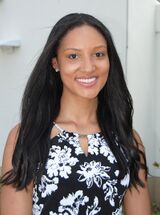
Antonia Bass
Mentor: Sunny Shin, PhD
Microbiology, Virology, and Parasitology Program
Thesis Title: Elucidating Human Inflammasome Responses to Legionella pneumophila and lipopolysaccharide variants
Research and Lab Description: My research focused on how interferon-induced host factors known as guanylate binding proteins (GBPs) promote human inflammasome responses to L. pneumophila, as well as focused on the roles of caspase-4 and caspase-5 in response to LPS variants. The Shin lab studies innate immune mechanisms against various bacterial pathogens and how bacterial pathogens evade host immunity.
Post PhD Plans: I am currently a Postdoctoral Research Fellow at Merck.
Mentor Comment: Antonia’s thesis research provided fundamental insight into how human inflammasomes respond to bacterial infection, which has important implications for their evolution and function. Antonia is a stellar scientist, and she is also a generous and kind person who helped promote a positive and inclusive culture within our lab. Antonia is also very committed to promoting diversity and inclusion in science, and she served as an exemplary role model and leader. Antonia was a founding member of the Penn SACNAS chapter, she mentored students, and she contributed to other activities on campus. I am so proud of Antonia, and I look forward to her continued success!
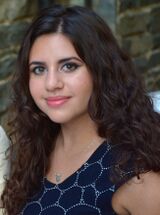
Anya Bauer
Mentor: Katharine Bar, MD
Microbiology, Virology, and Parasitology Program
Thesis Title: Development and Validation of Novel Transmitted/Founder SHIVs for HIV Persistence and Cure Research
Research and Lab Description: My thesis work focused on developing and validating novel macaque models of HIV infection. These models will enable us to evaluate HIV vaccines and cures in a model that is more relevant to human infection than those previously described. My work was completed in Dr. Katie Bar’s lab, which focuses on understanding the basic mechanisms of transmission, pathogenesis and persistence in HIV and other chronic viral infections.
Post PhD Plans: Currently, I am doing an industry postdoc where I am optimizing T cell redirecting bi-specific antibodies against solid tumors. Additionally, I am working as an interning regulatory scientist at my company.
Mentor Comment: Anya is an incredibly bright, focused, and effective scientist who accomplished a lot during her graduate work. Through several related projects, her work established key models for HIV cure research, enabling important discoveries in the area. She took on several challenging project and, through persistence and exacting standards, left an important scientific legacy. We continue to expect great things from Anya!
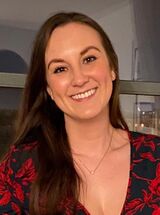
Sara Borst
Mentor: Paul Gadue, PhD
Developmental, Stem Cell, and Regenerative Biology Program
Thesis Title: Insights into Inherited Thrombocytopenia Resulting from Mutations in ETV6 or RUNX1 Using a Human Pluripotent Stem Cell Model
Research and Lab Description: My thesis project used induced pluripotent stem cells to model and compare a rare genetic bleeding disorder caused by mono-allelic germline mutations in either ETV6 or RUNX1. The Gadue lab studies human disorders which are not faithfully recapitulated in other animal models to learn more about developmental biology, and also leverages this knowledge to improve upon current differentiation protocols for future use in cell replacement therapies.
Post PhD Plans: I am a postdoctoral fellow in the Immunology and Respiratory department at Boehringer Ingelheim. My work aims to develop an iPSC-derived macrophage platform for target validation research.
Mentor Comment: Sara is hard working and dedicated. Her studies on modeling familial bleeding disorders using human stem cells have made important contributions. She found that two causes of this disorder while presenting with quite similar clinical manifestations work via distinct mechanisms. I wish her the best and look forward to seeing her future accomplishments!
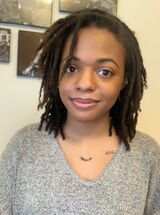
Niambi Brewer
Mentor: Eileen Shore, PhD
Genetics and Epigenetics Program
Thesis Title: Gnas Inactivation in Heterotopic Ossification
Post PhD Plans: Postdoctoral Fellow in the Genetic Diagnostic Laboratory at the University of Pennsylvania
Mentor Comment: Over the past several years, I have been extremely fortunate to work with a number of highly talented and creative graduate students – including Niambi. And, as I’ve come to learn, Niambi is drawn to forging new paths, so it’s little surprise that she chose to work on a ‘rarest of the rare’ genetic disease called progressive osseous heteroplasia (POH). Her work has given us important new insight into the disease and how bone forms, and is providing us with a strong foundation for new ideas and expanded approaches to investigate POH. I’ve loved working with Niambi and look forward to seeing her next accomplishments. Congratulations, Niambi – so many wonderful things are ahead for you!
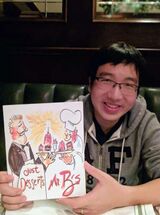
Zeyu Chen
Mentor: John Wherry, PhD
Cancer Biology Program
Thesis Title: Dissecting Transcriptional Control of CD8 T-Cell Responses
Research and Lab Description: I was a Ph.D student from Dr. E. John Wherry's lab studying transcriptional control of CD8 T cell response and found 1) miR-150-Myb controlling memory T cell survival; 2) TCF-1-centered network controlling effector/exhausted T cell fate decision; 3) Fli1 as a transcriptional safeguard of effector T cell response.
Post PhD Plans: I am currently a postdoc research fellow in Dr. Brad Bernstein's lab at Harvard Medical School/Broad Institute.
Mentor Comment: Zeyu was a transformative person to have in the lab. He established, with help from Junwei Shi’s lab, an amazing in vivo CRISPR screening system in mouse T cells that has changed everything for our group, and has already had a major impact on the field. Zeyu had a remarkable ability to operate constantly at the cutting-edge of both technology and biological advancement always immediately integrating new findings into work in the lab. Perhaps most impressive is Zeyu’s scientific generosity and contribution to everything going on around him. He contributed to more projects and science in my lab (and around campus) than I can possibly count. He will be a valued colleague for me in his future long and successful career.
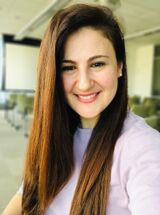
Jorida Coku
Mentor: Michael Hogarty, MD
Cancer Biology Program
Thesis Title: Elucidation of Cancer Therapy Resistance Mechanisms due to Altered Endoplasmic Reticulum-Mitochondria Tethering
Research and Lab Description: I had the privilege of conducting my thesis research in the laboratory of physician-scientist Dr. Michael D. Hogarty, which focuses on neuroblastoma translational biology. As the first graduate student in the lab, I had the opportunity to spread my wings wide and develop into an independent thinker and scientist, mentor younger undergrad students, and discover a novel contributor to broad cancer therapy resistance pertaining to "socially distanced" ER from mitochondria.
1fcd
Post PhD Plans: Scientist/oncology medical science liaison in pharmaceutical industry
Mentor Comment: Jorida is the first PhD student to enter our lab and she will be a very difficult act to follow! She is bright, energetic, hardworking and a tremendously warm-hearted and caring individual (true no member what species you are, but especially true if you are lucky enough to be a cat!)- her work in the lab was outstanding and has left us with some really exciting new areas to pursue!
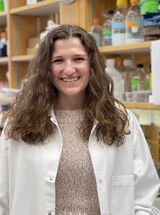
Courtney Comar
Mentor: Susan Weiss, PhD
Microbiology, Virology, and Parasitology Program
Public Health Certificate Program (PHCP) Certificate
Thesis Title: Interactions of Highly Pathogenic Human Coronaviruses with dsRNA-induced Innate Immune Pathways
Research and Lab Description: My thesis work in the Weiss lab focused on understanding how coronaviruses, such as MERS-CoV and SARS-CoV-2, evade or block activation of the innate immune responses during infection.
Post PhD Plans: In July I will be starting a two-year American Society for Microbiology CPEP fellowship in clinical and public health microbiology at the Hospital of the University of Pennsylvania and Children's Hospital of Philadelphia (HUP/CHOP). I am really excited to stay in Philadelphia and train to become a clinical microbiologist.
Mentor Comment: Courtney has been a pleasure to work with and watch her as she has matured scientifically. She has dual interests in infectious diseases and public health and as such has completed a public health certificate program as well as her PhD. Courtney project was to investigate MERS-CoV antagonism of innate immunity, before the pandemic. However, as SARS-CoV-2 emerged in late 2019, Courtney quickly became engaged in working both with clinicians to help devise safe ways to work with SARS-CoV-2 as well as to add research on SARS-CoV-2 to her thesis project on innate immune antagonism. She will go on to a fellowship in clinical microbiology, continuing to pursue merging her interests in infectious disease and public health.
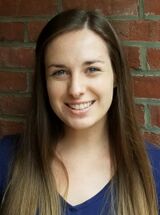
Devin Fisher
Mentor: Carolina Lopez, PhD
Microbiology, Virology, and Parasitology Program
Thesis Title: Teasing Apart the Immune Response to a Virus-Derived Adjuvant: Insights into Type 1 Immunity Inducing Vaccine Development
Post PhD Plans: Communications at the Vaccine Research Center, NIAID, NIH
Mentor Comment: Devin has been a pleasure to have in the lab. She became our go-to immunologists culminating her training with two first author manuscripts describing the mechanisms by which viral-derived RNAs function as effective adjuvants during vaccination. Devin’s passion lies in science outreach and communication and she is a role model for clear beautiful presentations of complex data and ideas. Devin is also a true team player and we will miss her!
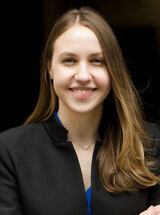
Katerina Gawronski
Mentors: Christopher Brown, PhD and Benjamin Voight, PhD
Genetics and Epigenetics Program
Thesis Title: Illuminating the genetic basis of complex liver traits in humans via computational genomics
Mentor Comments: We are elated to see Katerina finish up her dissertation work in the Brown/Voight lab! She has proven herself a dedicated and thoughtful scholar throughout this time, and a pleasure to work with over these past few years. While her transition into her next career phase comes slightly bittersweet - she will be sorely missed - we are excited to see her take her next steps and are certain that she will be a blistering success. Best of luck, Kat!
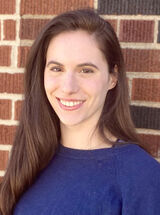
Hannah Greenfeld
Mentor: Mary Mullins, PhD
Developmental, Stem Cell, and Regenerative Biology Program
Thesis Title: Interpretation of the BMP morphogen gradient during dorsal-ventral axial patterning
Research and Lab Description: My research focused on how the BMP signaling gradient activates different genes in distinct regions of the zebrafish embryo during gastrulation. I completed my thesis work in the Mullins lab, where I had the opportunity to work with an incredible mentor and colleagues using the zebrafish embryo to study BMP signaling and patterning of the body plan.
Post PhD Plans: I will continue to study axis patterning as a postdoc in the Zernicka-Goetz lab at Caltech.
20da
Mentor Comment: Hannah has performed beautiful studies distinguishing between three models of BMP morphogen gradient interpretation in the zebrafish embryo. Her studies are elegant, highly rigorous and quantitative, using analysis tools she largely developed herself. Her creativity and initiative in developing new methods to best address the next scientific question will take her far in her career. It has been a true pleasure to have Hannah as part of the lab. I look forward to her future postdoctoral accomplishments and beyond!

Julie Heffler
Mentor: Benjamin Prosser, PhD
Cell Biology, Physiology, and Metabolism Program
Thesis Title: A Balance Between Intermediate Filaments and Microtubules Maintains Nuclear Architecture in the Cardiomyocyte
Mentor Comment: Julie was my first grad student, and it’s hard to imagine the lab without her! I’m lucky to have had such a multi-dimensional star - Julie truly drove her project from start to finish, and always holds her work to a remarkably high bar. Beyond drive and rigor, she is also kind, empathetic, and passionate about outreach. Plus she’s phenomenal at video games… so clearly the total package. She will be missed!

Ayon Ibrahim
Mentor: Zoltan Arany, MD, PhD
Cell Biology, Physiology, and Metabolism Program
Thesis Title: Exploring the Mechanisms of Basal and Stimulated Endothelial Fatty Acid Uptake and Transport
Research and Lab Description: During my time in the Arany Lab, I studied vascular fatty acid metabolism in various contexts. The science was fascinating, but my favorite part was the people - both my excellent mentor and my incomparable labmates. They were my colleagues, they were my friends, and they were instrumental in providing the best lab environment I could've ever hoped for.
Post PhD Plans: I have started a postdoctoral fellowship in the Farese and Walther lab at the Harvard School of Public Health, where I will be studying the mechanisms of cellular lipotoxicity.
Mentor Comment: Ayon was the first student to “risk” joining my lab when I arrived from Boston. His impact on the lab cannot be overstated! His combination of good humor, scientific enthusiasm, and refreshing perspectives, will be sorely missed.
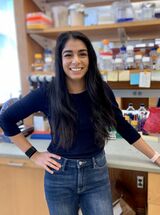
Nadia Kadry
Mentor: Joseph St. Geme, MD
Microbiology, Virology, and Parasitology Program
Thesis Title: Molecular Determinants of Immunogenicity of the Nontypeable Haemophilus Influenzae HMW1 and HMW2 adhesins
Mentor Comment: Nadia is an extremely talented, highly motivated, and hard-working student who is poised to have a significant impact on science and medicine. Her work represents a major advance in efforts to develop a vaccine against nontypeable Haemophilus influenzae and provides hope that we may be able to prevent the huge burden of morbidity associated with nontypeable H. influenzae infection. In addition, her studies may have applicability to vaccine development against other respiratory pathogens. It's been a treat to watch her develop as a scientist.
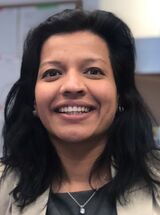
Sanika Khare
Mentor: M. Celeste Simon, PhD
Cancer Biology Program
Graduate Training in Medical Science (GTMS) Certificate
Thesis Title: Tumor Suppressive Role of Urea Cycle Enzymes in Renal Carcinoma
Mentor Comment: Sanika had a major impact on our laboratory during a difficult transition where several important papers were not in press yet, although they had received favorable reviews, and the first authors had departed for the next stages in their careers. Without complaining a single time, Sanika ensured that one key paper was accepted at a top tier journal. While this made her a co-first author on that publication, it delayed her thesis defense somewhat. We will be forever grateful for her generosity, which was also consistently on display with her organizing baby showers, birthday parties, and Halloween costume parties. Sanika has a bright future ahead of her that we will relish watching unfold!
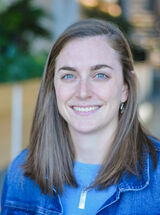
Marianne Kramer
Mentor: Brian Gregory, PhD
Genetics and Epigenetics Program
Thesis Title: Life after transcription: Post-transcriptional gene regulation and non-coding RNAs during stress and development
Research and Lab Description: My thesis centered on understanding the regulation of RNAs, including RNA folding and modifications, after they are transcribed, but before they are translated, degraded, or function as non-coding RNAs, in plants. The Gregory lab uses a combination of molecular biology, biochemistry and bioinformatics to ask questions about post-transcriptional gene regulation in plants, including RNA secondary structure, RNA-protein interactions, and RNA modifications.
Post PhD Plans: I am currently a Postdoctoral Associate in the R. Keith Slotkin Lab at the Donald Danforth Plant Science Center in Saint Louis, where we study transcriptional and post-transcriptional gene silencing.
Mentor Comment: The self-proclaimed “Queen of all things non-coding RNA” really embodies this title in her thesis research focus. From characterizing lincRNA biogenesis, to mRNA secondary stucture, and finally in characterizing the function of a long non-coding RNA and its affiliated proteins Marianne has truly traversed the RNA world in her graduate studies. Her love of RNAs will continue with her postdoctoral research into other new classes of RNAs. She truly is the Queen of all things RNA. We will miss her love of the RNA world and her true talent for research in the lab, and wish her all the best in her future endeavors.

Claudia Lanauze Torres
Mentor: Andrei Thomas-Tikhonenko, PhD
Cancer Biology Program
Thesis Title: Smad4 with R361 hotspot mutations retains the ability to bind to LEF1 and boosts WNT signaling in colorectal cancer cells
Research and Lab Description: My thesis focused on understanding how naturally occurring missense mutations in tumor suppressor Smad4 affect colorectal cancer progression. The Thomas-Tikhonenko lab has many interests, one of them being understanding how deregulation of certain pathways can lead to cancer development and progression.
Post PhD Plans: Since defending, I’ve been working in the field of healthcare consulting at Clarion Healthcare in Boston!
221e
Mentor Comment: Claudia’s arrival in the lab in the summer of 2015 coincided with my 3-month sabbatical during which I was in office only one day a week. Thus, I asked her to do a lot of research of her own and learn as much as possible from other lab members. Looking back, I suspect that this summer of DIY science might have shaped her entire graduate career. Claudia proved to be a fiercely independent student, determined to carve her own path through the project, define and fulfil her own Specific Aims, and yes, make her own mistakes (>1). But in the end of the day, her ownership of the project was complete and her recently published first-author paper - entirely her own. If that is not the ultimate goal of graduate education, what else is?

Linh Le
Mentor: Michael Marks, PhD
Cancer Biology Program
Thesis Title: Novel insights into the cellular basis of pigmentation using mouse models of albinism
Post PhD Plans: Medical Associate at Healthcare Consultancy Group
Mentor Comment: Linh has been an amazing contributor to my lab and to the field. She has made major contributions to four different projects in the lab – I don’t think I’ve ever had a student do that before! It is not often that one gets to host such an amazing, brilliant, rigorous, and thoughtful student from their freshman year of college through to their post-doc (with a few gaps in between); I have been very lucky over this time to have learned from Linh, benefitted from her many talents, and tremendously enjoyed working with her. I will miss her horribly as she moves on to her next challenge, but whatever she does, she will be successful!
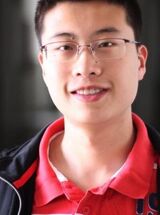
Jinyang Li
Mentor: Ben Stanger, MD, PhD
Cancer Biology Program
Saul Winegrad Dissertation Award Recipient
Blavatnik Fellowship Recipient
Thesis Title: Tumor cells as organizers of the tumor microenvironment: Tumor cell intrinsic regulation of anti-tumor immunity in pancreatic cancer
Research and Lab Description: My thesis identified tumor cell intrinsic factors (e.g. secreted proteins, signaling molecules, and transcriptional/epigenetic factors) that modulate tumor immune microenvironment and immunotherapy sensitivity of pancreatic cancer. We study tumor immunology, metastasis, cell plasticity, cancer metabolism, and liver regeneration.
Post PhD Plans: I’m currently a post-doc at the Rockefeller University studying neuroimmunology in the lab of Dr. Daniel Mucida.
205a
Mentor Comment: It is quite something to watch Jinyang operate. He is a voracious consumer of the literature, a broad thinker, and a masterful technician. His scientific productivity could put to shame some candidates for Assistant Professor. Plus, he is an enthusiastic collaborator who is always willing to share his expertise and insights. I cannot wait to see what he accomplishes in his postdoctoral fellowship and beyond.

Colby Maldini
Mentor: James Riley, PhD
Gene Therapy and Vaccines Program
Thesis Title: Chimeric Antigen Receptor T Cell Therapy for the Treatment of HIV
Post PhD Plans: Scientist at Beam Therapeutics
Mentor Comment: Colby, despite being a Patriots fan @Superbowl #52, was a joy to have in the lab. He was a leader, providing help and sound guidance to everyone. His productivity was second to none. Colby’s hard work formed a great collaborations, the basis and rationale of our next HIV CAR clinical trial, and a new understanding that T cells can be good at all things if they receive the right signals. I will miss our discussions/arguments as these drove the stories that his data told us.

Bihui Xu Melidosian
Mentor: Andy Minn, MD, PhD
Cancer Biology Program
Graduate Training in Medical Science (GTMS) Certificate
Thesis Title: Cancer Cell Antiviral Signaling Amplifies Transcription Output Through Chromatin Alterations to Drive Therapy Resistance
Research and Lab Description: My thesis was to understand how cancer cells use anti-viral pathways to become resistant to therapies such as radiation and immune checkpoint blockade therapies. Andy's lab utilizes cutting-edge tools such as CRISPR and single-cell sequencing to interrogate important questions that relate to treatment resistance.
Post PhD Plans: I'm currently a Research Investigator at Incyte trying to identify ways to improve response rate of immunotherapies in patients.
Mentor Comment: Couldn't be prouder of Bihui! Her determination, curiosity, and diverse talent was an invaluable asset to the lab. Bihui was a great team player and will be missed.
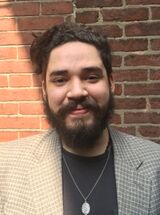
Ernest Monahan Vargas
Mentor: Yuanquan Song, PhD
Developmental, Stem Cell, and Regenerative Biology Program
Thesis Title: The Microtubule Regulator Ringmaker Functions Downstream of RTCA and the RNA Repair/Splicing Pathway to Promote Axon Regeneration
Research and Lab Description: Ernest's thesis work was on the RNA splicing/repair pathway and downstream microtubule associated proteins in neuronal injury and regeneration. The Song lab at the Children's Hospital of Philadelphia studies the molecular mechanisms of the establishment of neuronal circuits and mechanisms of injury and repair to the nervous system using various model organisms and paradigms.
Post PhD Plans: Scientific Writer for BioLegend
Mentor Comment: It was a joy to work with Ernest! Not only did he bring to the lab his thoughtful and insightful scientist traits, but also his warm personality and his musician talent! He demonstrated enormous perseverance which propelled him to achieve his career goals! He was the first recruit to the Song lab and played an essential role in establishing the lab. Ernest is particularly enthusiastic in applying his expertise to help people in need.
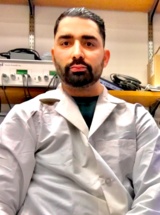
Leon Morales
Mentors: Hansell Stedman, MD and Jean Bennett, MD, PhD
Gene Therapy and Vaccines Program
Thesis Title: Development of Gene Therapy for Muscular Dystrophy and the Broader Implications of an Immune Response to Vector Encoded Antigens
Post PhD Plans: Postdoctoral Researcher at University of Pennsylvania School of Medicine
Mentor Comments: It has been an absolute pleasure working with Leon during his PhD and we are so proud to see him become an independent translational scientist. Leon made what we predict will be a historic contribution to development of treatments for Duchenne muscular dystrophy. He demonstrated that a dystrophin paralog is a remedy for the immunologic and technical challenges in treating this disease with gene therapy. In his final year as a graduate student and when the pandemic hit, Leon realized that his gene therapy and immunology findings were relevant to development of a SARS-CoV2 vaccine. While many students sheltered at home, Leon rolled up his sleeves and got to work with fellow students to come up with a promising test reagent. Whether he’s in the lab, working with patient groups, mentoring high schoolers, or with his family, Leon is nothing short of inspirational.
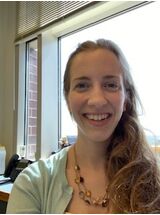
Deborah Moran
Mentor: Sarah Millar, PhD
Cancer Biology Program
Thesis Title: Regulation of Postnatal Epidermal Differentiation and Maintenance of Hair Follicle Stem Cell Quiescence by KLF4
Research and Lab Description: My thesis work focused on elucidating the functions of transcription factor KLF4 in hair follicle stem cell quiescence. I completed my thesis under the outstanding mentorship of Dr. Sarah Millar, whose lab uses genetic mouse models to ask questions regarding stem cell populations in skin epidermis and ectodermal appendages.
Post PhD Plans: I am currently a postdoctoral fellow in Dr. Thomas de Raedt's lab at the Children's Hospital of Philadelphia.
Mentor Comment: DJ was a key member of our research group. She made important discoveries regarding the transcriptional mechanisms that maintain quiescence of hair follicle stem cells as well as contributing to other efforts in the lab. I was really impressed by the independence DJ demonstrated in successfully completing her project and defending her thesis after most of our group moved to New York. DJ was a lively and collaborative member of my group and was a joy to work with.
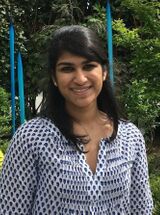
Somdutta Mukherjee
Mentor: Paul Gadue, PhD
Developmental, Stem Cell, and Regenerative Biology Program
Thesis Title: Loss of TBX3 enhances pancreatic progenitor generation from human pluripotent stem cells
Research and Lab Description: My thesis work focused on understanding how the transcription factor TBX3 influences fate decisions between liver and pancreas during human development. I did my thesis work in the Paul Gadue's lab where we use human pluripotent stem cells to model human development and disease, with a particular interest in diabetes. I was fortunate to have the opportunity to work with such a supportive group of people during graduate school.
1fb3
Post PhD Plans: I will stay on as a postdoc in the Gadue Lab.
Mentor Comment: Somdutta was a joy to have in the lab. She is an excellent lab citizen and generated a very nice thesis. Her work, studying the molecular mechanisms determining cell fate between liver and pancreas has made important advances. She has laid the foundation for future studies on this topic which has implications for using the human pluripotent stem cell system for disease modeling and therapeutics for diseases of the liver and pancreas. Congratulations Somdutta!
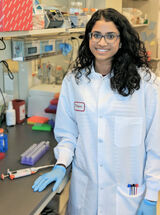
Kalyani Nambiar
Mentor: James Wilson, MD, PhD
Microbiology, Virology, and Parasitology Program
Thesis Title: Isolation and Characterization of Novel Adeno-associated Viruses for the Advancement of Gene Therapy
Post PhD Plans: Scientist I at Biogen
Mentor Comment: Kalyani took on an ambitious project to characterize a family of viruses that colonize primates called AAV. She was able to establish the DNA sequence of individual viral genomes that taught us about fidelity of virus replication and created a new generation of vectors for gene therapy.
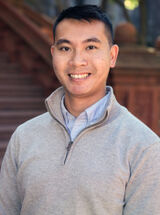
Son Ngoc Nguyen
Mentors: Michael Betts, PhD and James Hoxie, MD
Microbiology, Virology, and Parasitology Program
Thesis Title: Defining the Nature of CD8+ T Cell Response in Lymphoid Tissues of HIV-Infected Individuals: An Implication for HIV Cure
Research and Lab Description: I completed my dissertation in the labs of Michael Betts and James Hoxie, where I was surrounded by incredible colleagues who gave me incredible support and guidance. For my project, I focused on understanding the qualities of lymphoid tissue CD8+ T cells that are associated with viral control in a subset of HIV-1-infected individuals known as elite controllers.
Post PhD Plans: Postdoctoral researcher in Alex Shalek's lab at MIT.
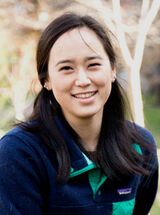
Mailyn Nishiguchi
Mentor: Edward Behrens, MD
Genetics and Epigenetics Program
Thesis Title: Recruitment and functions of myeloid cells at the intersection of inflammation and remodeling
Post PhD Plans: Postdoctoral Researcher at Zymo Research Corp
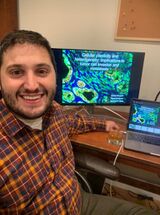
Robert Norgard
Mentor: Ben Stanger, MD, PhD
Cancer Biology Program
Graduate Training in Medical Science (GTMS) Certificate
Thesis Title: Cellular plasticity and heterogeneity: implications in tumor cell invasion and metastasis
Research and Lab Description: My thesis used novel mouse models to understand and discern mechanisms of tumor cell migration, invasion and metastasis, with a particular focus on a process known as epithelial to mesenchymal transition (EMT). My work found that a partial EMT program is mediated through calcium signaling and that MYC signaling regulates a tumor-immune interaction necessary for metastasis. The Stanger lab relies on genetically engineered mouse models to recapitulate salient features of pancreatic ductal adenocarcinoma and understand how tumors metastasize and identify vulnerabilities that will lead to better therapies.
Post PhD Plans: Post-Doctoral Fellow at Boehringer Ingelheim
Mentor Comment: Bobby has a no-nonsense approach to science – an intellectual honesty matched with experimental pragmatism. Bobby was a significant contributor to many projects, but his focus concerned a new program underlying epithelial-mesenchymal plasticity (i.e. EMT). We knew from the outset that defining the mechanism underlying a new program would be difficult, but Bobby successfully extracted his story with the patience of a fly fisherman. As lab “social chairman,” he was always up for something new and unprecedented, and I am sure his infectious enthusiasm will continue to touch his colleagues throughout his career.

Caleb Radens
Mentors: Yoseph Barash, PhD and Kristen Lynch, PhD
Genetics and Epigenetics Program
Thesis Title: Characterizing Local Splicing Variations from Heterogeneous RNA-Sequencing Datasets
Research and Lab Description: I developed methods to studying alternative splicing from heterogeneous RNA-Sequencing datasets. I was jointly mentored by Dr. Kristen W. Lynch and Dr. Yoseph Barash, whose labs used cellular/molecular/biochemical and computational approaches, respectively, to study the mechanisms and consequences of RNA processing in a variety of healthy or disease contexts.
Post PhD Plans: After graduating, I started a Scientific Investigator, Computational Biology role with GSK in their Human Genetics department.
Mentor Comments: Caleb was a proud member of the "Barynch lab", joint members between the Barash and Lynch labs. As such he contributed greatly to both labs, with his work on improving RNA splicing analysis pipelines with batch corrections and automatically classifying different types of alternative splicing events incorporated into highly usable algorithms for the RNA splicing community (MOCCASIN, MAJIQ). Caleb's continuous contributions to other lab members projects as well as lab culture -French dishes, viral memes, triathlons etc. - will definitely be missed. Good luck at GSK!
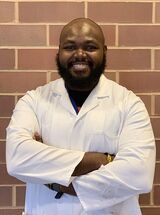
Kerry Roby
Mentor: Sandra Ryeom, PhD
Cancer Biology Program
Thesis Title: Response to Stress by the Tumor Microenvironment
Post PhD Plans: Neurosurgery Fellow at MD Anderson Cancer Center
Mentor Comment: Kerry is the one of most dedicated and hardworking trainees that has ever come through my lab. His perseverance in tackling a new area in the lab, mastering challenging experimental protocols and his growth as a scientist during his doctoral dissertation were truly remarkable. Kerry’s work identified a novel role for the tumor suppressor p19ARF in fibroblasts in the tumor microenvironment and specifically the role of p19Arf in modulating stress responses. It was a privilege to mentor Kerry and with his unlimited potential, I am excited to follow the many successes he will have in his scientific career.

Jesse Rodriguez
Mentors: Avery Posey, PhD and Carl June, MD
Gene Therapy and Vaccines Program
Thesis Title: HCMV CAR T cells as a Novel Platform for Glioblastoma Cancer Immunotherapy
Mentor Comments: It has been a joy to have supported Jesse through his doctoral work. His energy and enthusiasm for cell and gene therapy is infectious. Speaking of infections, his work tested a once controversial theory that targeting cytomegalovirus antigens in glioblastoma can lead to positive therapeutic outcomes. Jesse will continue building on CAR T cell designs and treatment strategies for glioblastoma as a postdoctoral fellow with Drs. Zev Binder and Don O’Rourke.
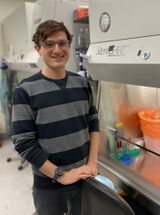
Ronnie Russell
Mentor: Beatrice Hahn, MD
Microbiology, Virology, and Parasitology Program
Thesis Title: CD4 receptor diversity among African primates protects against SIV infection
Post PhD Plans: Postdoc at Penn
Mentor Comment: Ronnie is a brilliant young scientist who has great potential to make seminal discoveries in years to come. He is highly creative, productive, and has a passion for science. I was most impressed with his tenacity and resourcefulness when faced with problems, and his rigorous and uncompromising strive for excellence. He often did what others said could not be done. Ronnie made numerous important discoveries, the most important of which was the unexpected finding that primate CD4 diversity represents an ancient protection mechanism against primate lentiviruses. His expertise, insight and positive attitude will be sorely missed.
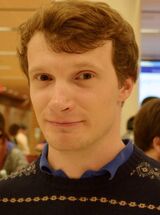
1fca
Benjamin Tajer
Mentor: Mary Mullins, PhD
Developmental, Stem Cell, and Regenerative Biology Program
Thesis Title: Elucidating the Heterodimer Signaling Mechanism
Research and Lab Description: For my thesis I studied the distinct signaling functions of Bmpr1, Acvr1 and Acvr2 within the BMP heterodimer receptor complex during Dorsal-Ventral patterning. I worked with zebrafish in Dr. Mary Mullins lab, and I had a great time - I will miss the lab, as well as working with the zebrafish, and participating in the DSRB grad program.
Post PhD Plans: I am starting my postdoc in Jessica Whited's lab at Harvard studying limb regeneration in the axolotl.
Mentor Comment: Ben is a true academic scholar! He really loves science and it has been part of his life since his childhood. In the lab, as a reviewer put it, some of Ben’s experiments are heroic! He showed that in embryonic patterning in the zebrafish, the two type I BMP receptors acting in a signaling complex have subfunctionalized, with the intracellular kinase domain of only one receptor able to transduce the BMP signal intracellularly, a complete surprise to the field. Ben has been a fantastic lab member both in his intellectual engagement and his team spirit! I look forward to his next accomplishments as a postdoc.
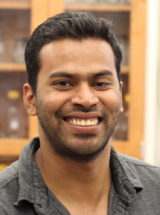
Jayesh Tandel
Mentor: Boris Striepen, PhD
Microbiology, Virology, and Parasitology Program
Thesis Title: Life cycle progression and sexual development of the apicomplexan parasite Cryptosporidium parvum
Post PhD Plans: Postdoctoral Researcher at Center for Cellular Immunotherapies, University of Pennsylvania
Mentor Comment: Jayesh is an exceptionally talented molecular biologist. In his dissertation Jayesh studied the cellular mechanisms of the sexual life cycle of the parasite Cryptosporidium and unraveled its transcriptional control. Jayesh is a deep conceptual thinker and a fearless experimentator. He is a connoisseur of good food, a great colleague, and a future captain of industry.

Qiaosi (Tracy) Tang
Mentor: Anil Rustgi, MD
Cancer Biology Program
Thesis Title: Mutant p53 mechanisms and functions in esophageal cancer
Research and Lab Description: My thesis work focused on the functions and mechanisms of mutant p53 in metastatic esophageal cancer. I completed my thesis research in the lab of Dr. Anil Rustgi, where I was surrounded by a great group of people making my PhD training an amazing experience.
Post PhD Plans: I am currently a postdoctoral research fellow in Columbia University Herbert Irving Comprehensive Cancer Center.
Mentor Comment: Tracy has been an exceptional PhD student. She demonstrates always intellectual curiosity, technical aplomb, selfless collaboration and energetic productivity. Her resilience stands tall, both professionally and personally. There is no doubt that she will continue to succeed at the highest level as a scientist, teacher and humanitarian.
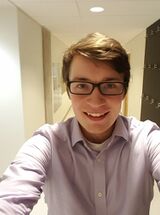
Louis Taylor
Mentor: Frederic Bushman, PhD
Microbiology, Virology, and Parasitology Program
Thesis Title: Virus Hunting Using Metagenomic Sequencing: Discovery and Initial Characterization of the Redondoviridae Family
Research and Lab Description: I studied redondoviruses, a new family of small DNA viruses discovered by our lab, seeking to understand how widespread they are, how they replicate, and whether they cause disease. The Bushman lab studies the interactions between humans and their pathogenic and commensal microbes using both molecular and computational methods.
Post PhD Plans: I'll be studying emerging RNA viruses as a postdoc in Matt Frieman's lab at UMD.
Mentor Comment: Louis was a terrific student who made some really exciting discoveries. He worked with Dr. Ron Collman and me to study the virome of the respiratory tract. Together with former student Arwa Abbas, Louis identified the Redondoviruses, a group of human-associated viruses that are the second most common in human airway. Follow up studies showed that Redondoviruses are associated with several human disorders; the links are unclear and today the topic of close study. Louis has the unique distinction in lab history that his work resulted not only in interesting papers, but a Wikipedia article as well!
Combined Degree, MD-PhD
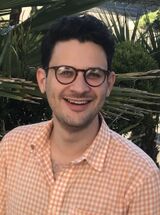
Anthony Angueira
Mentor: Patrick Seale, PhD
Genetics and Epigenetics Program
Thesis Title: Transcriptional Control and Development of Energy Burning Fat Cells
Research and Lab Description: My thesis work sought to identify key factors required for controlling the gene expression of energy burning fat cells and the precise progenitor cells for making energy burning fat cells in vivo. The Seale lab studies the pathways and cell types responsible for adipocyte development and function.
Post PhD Plans: Medical School
Mentor Comment: It has been a real pleasure to work with Anthony over the past several years. He has been a lynch pin of my lab, driving several projects on his own and contributing many new ideas for ongoing and future work. His studies represent important contributions in the field of adipose tissue development and biology. He is smart, rigorous and passionate about his work. I had so much fun working with Anthony. I have no doubt that he will become a future star and I look forward to watching his career develop from here.
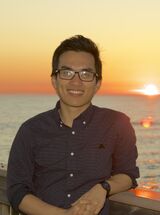
Hoang Bui Nguyen
Mentor: Mitchell Lazar, MD, PhD
Genetics and Epigenetics Program
Saul Winegrad Dissertation Award Recipient
Thesis Title: Dichotomous Engagement of HDAC3 Catalytic Activity Governs Inflammatory Responses
Post PhD Plans: Medical Student
Mentor Comment: It has been wonderful to have the opportunity to mentor and work with Hoang. He is a force of nature, with his unique combination of palpable enthusiasm and giant intellect. Equally proficient in bioinformatics and wet benchwork, Hoang was like a supernova whose transient presence in my lab was highly productive and led to what I am sure will be lifelong friendships. I look forward to admiring Hoang's post-PhD successes as he moves ahead in his career.
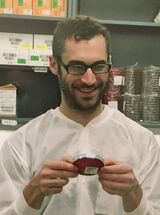
Grant Eilers
Mentors: Frederic Bushman, PhD and Gregory van Duyne, PhD
Microbiology, Virology, and Parasitology Program
Thesis Title: Structural and Biochemical Studies of HIV-1 Integration and Inhibition
2031
Mentor Comments: Grant Eilers was a terrific MD/PhD student who completed his thesis working with the Van Duyne and Bushman laboratories. Grant carried out structural studies of HIV integrase protein and generated a series of revealing structures of drug complexes. His work set the stage for new rounds of lead optimization and pharmaceutical development. Grant was a warm person with many talents who made seminal contributions to his field of study.
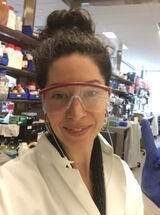
Melody Esmaeili Ghahfarokhi
Mentor: Peter Klein, MD, PhD
Developmental, Stem Cell, and Regenerative Biology Program
Thesis Title: Chromatin accessibility and histone acetylation in the regulation of competence in early development
Research and Lab Description: I studied chromatin accessibility and histone acetylation in the regulation of competence in early development using Xenopus laevis.
Post PhD Plans: Internal Medicine residency at UC Irvine.
Mentor Comment: Melody completed a combined degree during extraordinary times with strength and equanimity. She had a real knack for embryological experimentation, picking up microdissection and microinjection techniques and principles rapidly, and she impressed me with her ability to integrate clinical and basic science information in creative ways.
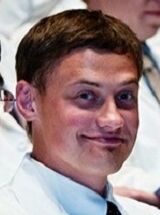
Piotr Kopinski
Mentor: Douglas Wallace, PhD
Cancer Biology Program
Thesis Title: Regulation of nuclear epigenome by mitochondrial DNA heteroplasmy
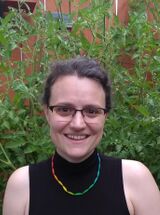
Sabine Schneider
Mentor: Robert Heuckeroth, MD, PhD
Genetics and Epigenetics Program
Thesis Title: Novel insights into the genetic and environmental determinants of enteric nervous system biology
Research and Lab Description: My thesis research has focused on elucidating mechanisms underlying enteric nervous system (ENS) development and disease, including using single-cell RNA sequencing to identify novel genetic regulators of ENS development, studying the role of the epigenetic regulator Bap1 in ENS development, and understanding the impact of environmental factors on the severity of congenital ENS disorders. The Heuckeroth lab is an incredibly supportive and collaborative community. I feel lucky to have had the opportunity to learn from and work alongside such outstanding scientists and friends. My mentor, Dr. Heuckeroth has gone out of his way many times to support me scientifically and personally and I am eternally grateful for his commitment to my success and, most importantly, my well-being.
Post PhD Plans: Medical Student
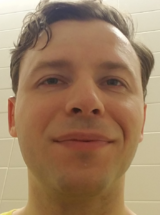
Krzysztof Wojtak
Mentor: David Weiner, PhD
Gene Therapy and Vaccines Program
Thesis Title: Preventive and Therapeutic DNA Technologies Targeting Epstein-Barr Virus
Mentor Comment: It was always exciting to have Kris in the lab, he was a ball of scientific energy. His development of multiple interesting designed glycoprotein immunogens for EBV and their detailed immune characterization opened a new door for the lab to focus on. His ability to integrate clinical aspects of disease as he discussed his research was exciting and valuable for the lab. Im looking forward to seeing his continued accomplishments in this next important phase of his career!
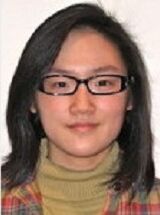
Salina Yuan
Mentor: Ben Stanger, MD, PhD
Cancer Biology Program
Thesis Title: Epigenetic Reprogramming in Tumor Plasticity
1f18
Mentor Comment: When it comes to science, Salina has a sixth sense. Before she joined the lab, we had done next to nothing with epigenetics or CRISPR screening. So naturally, Salina decided she should do epigenetic CRISPR screens for her thesis project, and did so successfully not once but twice. Her studies provided fundamental insights into the regulation of cellular plasticity and immune regulation in pancreatic cancer. Plus, she is a fantastic team player and one of the most rigorous researchers I have ever met. She will be an awesome physician-scientist wherever her path leads, and I can’t wait to follow her success.
Combined Degree, VMD-PhD
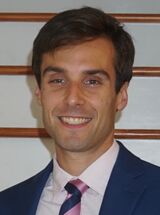
Ian Penkala
Mentor: Edward Morrisey, PhD
Developmental, Stem Cell, and Regenerative Biology Program
Thesis Title: Progressive Reliance on Epithelial Plasticity Governs Lung Development, Homeostasis, and Regeneration
Research and Lab Description: For my thesis work I described the postnatal development of the alveolar epithelium and the differences in epithelial repair after lung injury at different stages of development, discovering an unprecedented role for the alveolar type 1 cell in this process. The Morrisey lab is a powerhouse of lung biology research, with recent work redefining our understanding of lung development and repair, performed by a collaborative and multidisciplinary team.
Post PhD Plans: Veterinary school clinical rotations, then studying the clinical and mechanistic parallels of veterinary and human lung disease
Mentor Comment: Ian was pretty amazing in the lab. His work changed the paradigm of how the lung alveolus regenerates across the lifespan, revealing an extensive level of cell fate reprogramming that was simply unexpected. On a personal note, having Ian in the lab was a blast! I will long remember our daily discussions on science, life, and the universe.
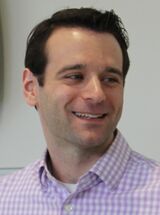
Gregory Sousa
Mentor: Michael Povelones, PhD
Microbiology, Virology, and Parasitology Program
Thesis Title: Dissecting the melanization immune response in the malaria vector Anopheles gambiae
213a
Research and Lab Description: I developed a simple, straightforward technique to identify proteins required for the melanization immune response in Anopheles gambiae mosquitoes, and I used this approach to advance our understanding of how melanization protease cascades are activated and regulated! The Povelones lab is broadly interested in how mosquito disease vectors interact with the microbial world.
Post PhD Plans: I will be returning to Penn Vet to finish my final two years of veterinary school. Ultimate career goals are still crystallizing, but I have a strong interest in laboratory animal medicine.
Mentor Comment: Greg is an incredibly talented scientist, and it has been a pleasure to work with him. He’s dedicated and has great hands. You will never see prettier collection of western blots than those in his paper and thesis. More than that, Greg has a critical mind and keen attention for detail. These qualities allowed him to develop a novel method to non-destructively assess immune function in mosquitoes that other labs are now adopting. Using this assay Greg discovered and beautifully characterized an important component of the immune system in Anopheles gambiae, the main vector of malaria in Africa. I am impressed with all that Greg has accomplished and look forward to seeing what’s next!






